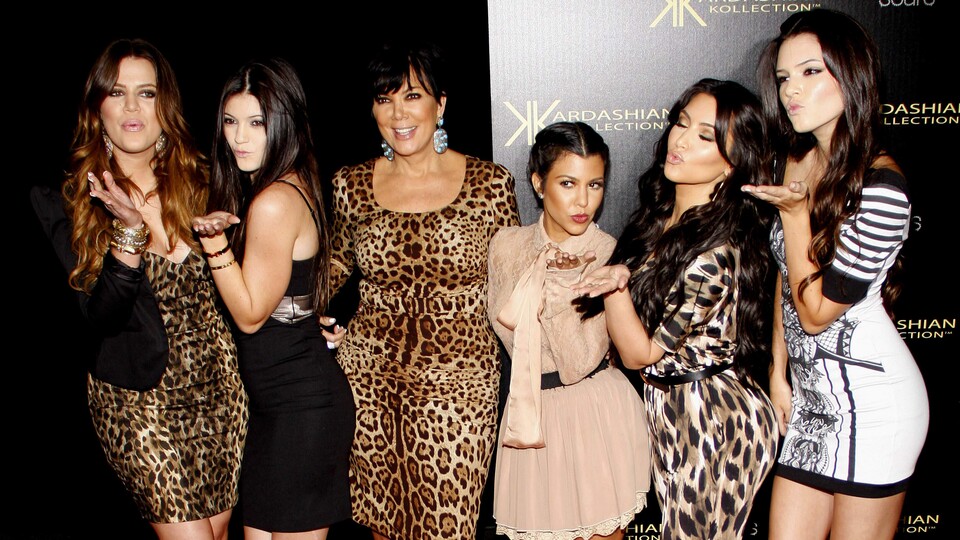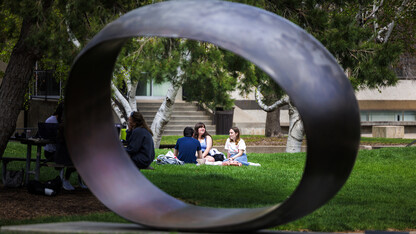· 4 min read
Britten teaches Kardashians in the classroom

From TV commercials for their feature show on the E! network to grocery store check-out lane magazines splashed with their faces, it’s hard to go anywhere without coming across the escapades of the Kardashian clan.
And now, the College of Journalism and Mass Communication’s Kelli Britten, assistant professor of practice, has brought the Kardashian family to the University of Nebraska–Lincoln’s classroom.
Her special topic course, “Keeping Up with the Kardashian Brand” has been a popular pick within the college for two semesters. With seats filled and students on the wait list, Britten knows she’s come upon something special with the Kardashian-based curriculum.
While the family helps draw students in and focuses attention, they’re also a great way to introduce advertising and media concepts.
“I feel like for a number of years I would just randomly use Kardashians as examples in classes when we’re talking about brands, products, audiences… or advertising reflecting culture and advertising influencing culture,” Britten said.
Britten’s class does a deep analysis of the Kardashian business brand. The family is known for their variety of businesses — with each daughter having a brand (or two) of their own. You might have heard of SKIMS, the comfortable apparel line, or Good American, the curvy denim company. Or maybe you saw a bottle of 818 Tequila while you were strolling by the liquor aisle. Then there’s Kylie Cosmetics, made famous for their lip kits containing all the pieces for a perfect pout, and Poosh, the lifestyle media outlet.
“There’s no other family doing it,” Britten said. “There may be an individual doing this, building from growing up as an influencer and then monetizing that with multiple revenue streams, but not at this level and not was such permanency.”
With plenty of examples of media strategy, product placement and public relations scandals among the Kardashian clan, Britten was able to create an entire course curriculum around the family. The core of class is formed around three learning objectives: learning what celebrity means, understanding branding, and understanding influencers in relation to digital strategy.
“I think there was very much a perception that it was going to be like, let’s watch this TV show and gossip… We’ve got a textbook that is academic based, I pull from probably 13 or 14 other books for a lecture content that they’re reading, and then they’re probably reading between 15 to 20 peer-reviewed academic articles,” Britten said.
Britten also thinks the popular culture aspect of the Kardashians makes the content more accessible to her students. She says that while a few students in her class are hardcore Kardashian fans, there’s plenty of others who are just interested in influencers or taking the course because it’s an interesting elective.
And Britten’s not the only professor that’s realized celebrities can inform curriculum. New York University recently made headlines for their Taylor Swift-inspired course investigating the songstress’s cultural impact and relevancy. And with influencers and celebrities continuing to develop the world of digital strategies and marketing, there’s certainly more academic interest in the subject.
Overall, Britten has found that bringing the Kardashians into the classroom has been a very effective educational tool for her advertising students. By combining the popular culture they already consume with advertising concepts and literature, Huskers are able to see the strategies they read about in their textbooks take place in real life. One student surmised it in a course review left at the end of the semester — stating, “I didn’t even realize I was learning.”
“People don’t view reality TV as serious because it’s fake and pretending to be real, but from a consumer standpoint, we like it because it’s aspirational. It mimics our lives or it’s more relatable in a way. But when we look at popular culture as a critical pedagogy to teach, it is incredibly effective,” Britten said. “Especially when we look at our audience of Gen Z-ers — they’re spending all their time on their phone, they’re consuming culture and learning about society in a very, very different way.”








